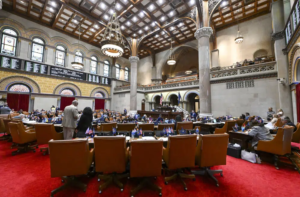TULSA, Okla. — Gov. Kevin Stitt has officially been removed from the 1921 Tulsa Race Massacre Centennial Commission.
The comes after Stitt signed a bill limiting race and gender curriculums in Oklahoma schools earlier in May. House Bill 1775 prohibits state public schools, colleges, and universities from incorporating certain messages about sex and race into any course instruction.
This also comes on the 100th anniversary of the 1921 Tulsa race massacre, where a white mob attacked Black residents and businesses in the Greenwood District of Tulsa, also known as Black Wall Street.
The governor’s office released the following statement Friday afternoon:
Governor Stitt’s role as a member of the 1921 Tulsa Race Massacre Centennial Commission has been purely ceremonial and he had not been invited to attend a meeting until this week.
It is disappointing to see an organization of such importance spend so much effort to sow division based on falsehoods and political rhetoric two weeks before the centennial and a month before the commission is scheduled to sunset.
The governor and first lady will continue to support the revitalization of the Greenwood District, honest conversations about racial reconciliation and pathways of hope in Oklahoma.
The commission sent 2 News the following statement:
The 1921 Tulsa Race Massacre Centennial Commissioners met Tuesday and agreed through consensus to part ways with Governor Stitt. No elected officials, nor representatives of elected officials, were involved in this decision. While the Commission is disheartened to part ways with Governor Stitt, we are thankful for the things accomplished together. The Commission remains focused on lifting up the story of Black Wall Street and commemorating the Centennial.
With just weeks before the Centennial of one of the worst Race massacres in the history of the U.S., Commissioners stand united in focusing time, energy and efforts on descendants, survivors, education, economic development and progress this year and beyond. We hope to see many of you in person or virtually at some of our events that we hope will drive change for years to come.
The commission previously issued Stitt a letter after he did not join a special meeting Monday night to discuss the signing of HB 1775 into law.
Phil Armstrong, the project director of the 1921 Tulsa Race Massacre Centennial Commission, said HB 1775 “chills the ability of educators to teach students, of any age, and will only serve to intimidate educators who seek to reveal and process our hidden history. You know that. We delivered this message to you before you signed the measure. We were joined by educators, school boards, universities, faith, and community leaders, all of whom vigorously objected to HB 1775. You seemingly disregarded and dismissed this chorus of voices aligned against HB 1775.”
The governor responded by saying, in part, “it is disappointing that some commission members feel that a common-sense law preventing students from being taught that one race or sex is superior to another is contrary to the mission of reconciliation and restoration.”
C.J. Webber-Neal, president of the Greenwood Arts & Cultural Society, INC., also called for the governor’s resignation as a commission member. In a statement, Webber-Neal said he was satisfied with having Stitt removed from the commission.
The Greenwood Arts & Cultural Society, INC. is very pleased that the 1921 Tulsa Race Massacre Centennial Commission has with one concise voice taken action to remove Kevin Stitt, Governor of Oklahoma, from it body.
Based upon the stated mission of this body, we stand in solidarity with their action regarding Governor Stitt’s role as a member of this Commission, based upon his signing of HB 1775 into law. The truth of the horrific story of 1921’s Race Massacre (as well as other history of the experiences of minorities in America) must be taught honestly and unequivocally, so that future generations will learn of the demons of our past so we as a society will not be doomed to repeat this evil act.
At this time, we also encourage this body to add in the Governor’s place survivors and descendants of the massacre, so that representation of this painful period in our hpistory can be reflected thru the experiences of those who were directly impacted by this tragic event.
Furthermore, we encourage any available monetary relief be given by this organization to the three survivors of the 1921 Tulsa Race Massacre. This should be done as both a sign of reconciliation and the rising of the eternal spirit of Greenwood. This we believe is long overdue.




